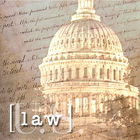
Fourth Amendment to the US Constitution:
NOT ALL POLITICS IS OPINION It is simply not true that all text and all language are opinion. That bias gives rise to a radical perversion of the "fairness doctrine", whereby all stories, no matter how evidentially sound, must include reference to at least one assertion that contradicts the lead story, no matter how evidentially void this oppposing assertion. [Full Story] |
JUSTICE DEPT. ISSUES REPORT DEFENDING WARRANTLESS WIRETAPS The US Department of Justice, under Attorney General Alberto Gonzales, who advised Pres. Bush as White House Counsel, during the planning of the extrajudicial wiretaps, has issued a 42-page report that claims authorization for the wiretaps was implicit in the preliminary "Authorization for the Use of Military Force" (AUMF), passed after the attacks of 11 September 2001. Some who support the White House position have been quick to say this resolves the issue, but critics note a number of problems with the report and its premises. One would be the attorney general himself and his role in initiating the program; he has faced criticism that he was guilty of violating federal law for participating in the program. Another objection would be on legal grounds: a number of legal principles come into play. 1st, the Foreign Intelligence Surveillance Act forbids spying on Americans without judge-ordered warrants supported by evidence. 2nd, the Fourth Amendment to the US Constitution forbids searches not supported by judicial warrant, based on "probable cause" for suspicion of the target as a criminal offender. 3rd, the AUMF does not give any such authorization. The report from Justice, in perfect alignment with the recently announced defense provided by AG Gonzales, states that in authorizing the president to "use all necessary and appropriate force against those nations, organizations, or persons he determines planned, authorized, committed, or aided the terrorist attacks", with an aim to preventing future actions by the same individuals, the AUMF also empowered the president to circumvent required legal procedures for domestic spying. The AUMF never mentions any power to override federal law and it never empowers any member of the administration to perform domestic surveillance without specific judicial authorization, as required under federal law. In fact, a major controversy related to the AUMF demonstrates its limitations: the administration had reportedly sought to include language that would allow the "use of military force" on American soil. This language was never inserted and senators took pains to publically state that the law would not apply within US borders. By extension, it would be unreasonable to assume that any part of its language could be construed to authorize any action domestically not directly related to organizing the military for overseas deployment. Furthermore, the very existence of the AUMF implies (more than it implies any other undeclared reality) that the president cannot take actions that require legal approval, without first getting that approval. Then, there is the principle that where two laws conflict, it is the one which more clearly outlines a limit on government power or a concrete right of individuals, which must prevail. If, for instance, a government is empowered to use capital punishment, but all individuals are guaranteed the right to a legal process where only certain courts, with certain types of rulings, based on certain charges, can apply a sentence of death, the two laws are not in direct competition, because the individual right not to be executed arbitrarily is higher than the government's power to apply capital punishment. Executive discretion is limited by law and by process. The same principle applies to wiretaps. There is no specific power for federal agents to use wiretaps without the specific and affirmative legal consent of a federal judge. Even were any such power to be implied by the AUMF, it would not supercede the Constitution or FISA, which openly declare their prohibition of such activities. This issue, as a point of critique for the wiretap policy, is complicated by a Justice Dept. spokesperson, Steven Bradbury, informing reporters that the AUMF "is not a blank check that says the president can do anything he wants", in which case, it would be much more difficult to specifically construe special legal powers to circumvent existing law in the area of domestic surveillance. Furthermore, there is no tradition in American jurisprudence of explicitly worded laws being interpreted to covertly grant the power to override existing laws. The attorney general's claim that the AUMF did this contradicts American legal tradition and history, and his own reported prior admission that existing law specifically prohibits warrantless wiretaps. Whether or not any one arm of the government will act concretely to define the controversy one way or the other, remains to be seen. Congress is holding hearings to examine the legality of the wiretaps, and the courts are likely to hear cases brought by individuals who may find they were the targets of extrajudicial eavesdropping. [s]
STORY UPDATE: Attorney Gen. Alberto Gonzales, while speaking to a group at Georgetown University, defended the president's authorizing the warrantless wiretaps carried out by the NSA on US citizens. He reiterated the drumbeat that it was the 2001 Authorization for the Use of Military Force against Al Qaeda that gave the president the authority to execute warrantless wiretaps, despite prohibitions in federal law. During the speech, a group of about 20 protesters stood with their backs to Gonzales, while some held up a banner reading "Those who would sacrifice liberty for security deserve neither", quoting Benjamin Franklin. [Full Story]
BACKGROUND: Former US Vice President Al Gore gave what is being described as an historic non-partisan speech, calling for a passionate nationwide movement to defend and uphold the Constitution of the United States. Gore gave the speech in a non-partisan context, speaking at the Daughters of the American Revolution hall, with the express support and participation of Representative Bob Barr, Republican of Georgia. [Full Story] |
||||||
|
|||||||

